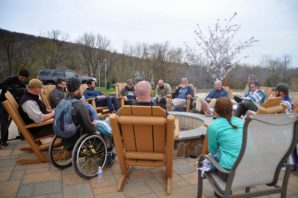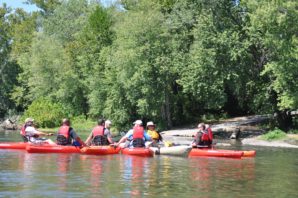

June is National PTSD Awareness Month and June 27th is PTSD Awareness Day. In the wake of 15 consecutive years of war, a great deal of attention has been paid to Post Traumatic Stress Disorder (PTSD) and combat-related stress amongst combat veterans. According to the U.S. Department of Veterans Affairs, between 11-20 percent of those who served in Iraq and Afghanistan have PTSD.
The majority of efforts to support and assist these remarkable men and women focus on managing and mitigating the symptoms associated with PTSD, using a combination of psychotherapy and medications. However, a growing body of research suggests that there is a different approach that may prove far more effective.
This new approach is Post Traumatic Growth (PTG), an extensively-researched and evidence-based framework designed to transform times of deep struggle into growth and a profound sense of strength. PTG first entered the academic literature in 1995, through the work of UNC-Charlotte psychologists Dr. Rich Tedeschi and Dr. Laurence Calhoun.
“Combat is an experience like no other,” explains Ken Falke, chairman and founder of Boulder Crest Retreat and a combat veteran. “We know that as a result of enduring war, our combat veterans possess strengths, skills and abilities that are seldom seen and desperately needed here at home.”
Boulder Crest Retreat is developing the nation’s first non-clinical curriculum based on Post Traumatic Growth, called Warrior PATHH, working in collaboration with Dr. Tedeschi and Dr. Bret Moore, a former DOD Psychologist who was embedded with soldiers in Iraq for 2.5 years.
“Far too much of the conversation about PTSD and combat veterans focuses on what is wrong with these men and women, and the traumas of war,” says Josh Goldberg, director of strategy at Boulder Crest Retreat. “While coming home from war can be challenging, thousands of years of history supports our belief that combat veterans can and do accomplish incredible feats in the aftermath of war.”
In order to make that possible, there are five things that combat veterans, and supportive community members can do to transform PTSD into PTG:
- Reconnect with fellow veterans in positive settings. Being able to spend time around other veterans in a positive atmosphere helps veterans to make peace with their experiences and move forward. Look for local support and social groups (such as Team Red, White & Blue) that are positive and well-run, or create your own.
- Spend time in nature, being active. There are many therapeutic benefits to spending time in nature and being active. When you can combine the two and do them together, you will get some great benefits. Plan to go hiking, take up running, biking, or get out on the boat. Every morning in the military began with 1-2 hours of PT, and some form of that must continue.
- Find outlets that tap into your imagination and creativity. There are a host of organizations across the nation that provide discounted or free opportunities for veterans to learn music, yoga, art, or spend time with horses. These practices are great ways to cultivate calm and peace within, and release stress and anxiety. Each has a strong evidence-base specific to combat veterans.
- Don’t just sit there, do something. Many veterans with PTSD tend to isolate and turn to unhelpful coping mechanisms, like drugs and alcohol. Sitting on the couch does not help with growth. The key is to find activities that allow you to get out of your own head, and into the world. One of the best ways to do this is by serving others. Combat veterans have an inherent understanding of the power of service, but often stop once they transition from the military. Remember: once you start serving, you can never stop. Communities around the country need your strength, leadership and ability to get things done.
- Take the family with you. When one person is struggling in a household, the whole family is impacted. It is critical to engage in activities that uplift the entire family, even if you aren’t feeling up to you. Time out for family picnics, trips to the zoo or at wellness retreats, make a huge difference on spouses and kids.
“Combat veterans know, more than most, that what does not kill us makes us stronger,” continued Falke. “We have been tested and forged. The key is to find ways to bring our unique talents to bear at home, so we can continue a life of service to our family, community and country.”
Boulder Crest Retreat’s breakthrough curriculum initiative represents the first-ever effort to develop a scalable and non-clinical approach to PTSD and combat-related stress. It includes a robust training program, student and instructor guides, comprehensive program evaluation and a technology platform – and is designed to ensure that a new and innovative approach, focused on strengths, growth, and solutions, can be adopted across the country.
“After World War II ended, a legion of combat veterans returned home to build the America we have today, and are known as The Greatest Generation,” continued Goldberg. “After 15 years of war, there is every reason to believe the men and women who served in Iraq and Afghanistan should receive that baton. We know, from our experience working with these men and women every single day, that it isn’t only possible – it is mandatory.”
Boulder Crest Retreat is a 501 (c)(3) nonprofit organization that is funded entirely by private donations by individuals and organizations from around the country. For more information about the retreat, please go to www.bouldercrestretreat.org. View a video about Boulder Crest Retreat here: https://www.youtube.com/watch?v=KztgmScOQLw. For more information about Boulder Crest Retreat, please visit http://www.bouldercrestretreat.org.

